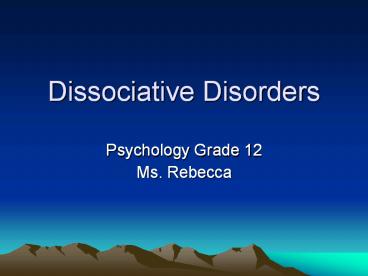Dissociative Disorders - PowerPoint PPT Presentation
1 / 14
Title:
Dissociative Disorders
Description:
Dissociative Disorders Psychology Grade 12 Ms. Rebecca I. Dissociation Separation of personality parts or mental processes from conscious thought. – PowerPoint PPT presentation
Number of Views:303
Avg rating:3.0/5.0
Title: Dissociative Disorders
1
Dissociative Disorders
- Psychology Grade 12
- Ms. Rebecca
2
I. Dissociation
- Separation of personality parts or mental
processes from conscious thought. - In English Zoning out
- Example You may be so involved in listening to
a Psychology lesson you cant hear when someone
calls your name.
3
A. When is Dissociation a disorder?
- When it is used as a way to avoid stressful
events or feelings.
4
Examples
- Someone loses their memory of a painful
experience (rape, child abuse etc) - Lose memory of identity!
5
II.Types of Dissociative Disorders
- A. Dissociative Amnesia- Sudden loss of memory,
usually right after a stressful or traumatic
event.
http//www.cartoonstock.com/newscartoons/cartoonis
ts/mba/lowres/mban1522l.jpg
6
A. Dissociative Amnesia-
- Usually people with Dissociative Amnesia forget
events during a period of time around the trauma
but sometimes a person may forget ALL prior
experience and may be unable to remember his/her
name, recognize friends and family or recall
personal information.
7
1. How does it get fixed?
- Memory is likely to return just as suddenly as it
is lost.
http//i184.photobucket.com/albums/x34/clowndikk/L
ongKissGoodnightThe1996104415_f.jpg
8
B. Dissociative Fugue
- Another type of Dissociative Disorder
- 1. Multiple personalities
- Different personalities may or may not be aware
of the others and each personality takes turns
controlling the person.
9
B. Dissociative Fugue
- 2. Each personality is likely to be different
from the others in ways like - - voice
- - facial expression
- - perceived age
- - gender
- - physical characteristics
10
B. Dissociative Fugue
- 3. Why do people get Dissociative Fugue?
- Usually severely abused as children
http//www.humanillnesses.com/original/images/hdc_
0001_0002_0_img0178.jpg
11
3. Depersonalization Disorder
- -Feelings of detachment from ones mental
processes or body. Out of body experience.
http//i31.tinypic.com/i4kfp0.jpg
12
3. Depersonalization Disorder
- Why does it happen?
- Often goes with other psychological disorders
- A likely to occur after a stressful event
13
III. Explaining Dissociative Disorders
- 2 different views
- 1. Psychoanalitical- people dissociate to
repress unacceptable urges - 2. Learning- Learn to not thing about disturbing
events to avoid feelings of guilt, shame or pain - Dissociate by forgetting painful events! It
works! Anxiety is reduced when a trauma is
forgotten but..
14
Homework
- Use your notes and book to fill in the
Dissociative Disorders worksheet and define - Key terms
- Dissociative Disorders
- Dissociation
- Dissociative Amnesia
- Dissociative Fugue
- Dissociative Identity Disorder
- Depersonalization Disorder































